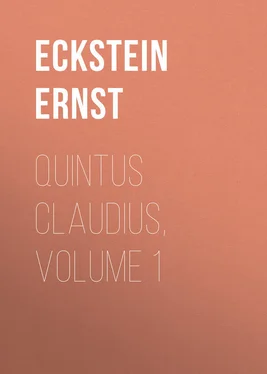Ernst Eckstein - Quintus Claudius, Volume 1
Здесь есть возможность читать онлайн «Ernst Eckstein - Quintus Claudius, Volume 1» — ознакомительный отрывок электронной книги совершенно бесплатно, а после прочтения отрывка купить полную версию. В некоторых случаях можно слушать аудио, скачать через торрент в формате fb2 и присутствует краткое содержание. Жанр: foreign_antique, foreign_prose, на английском языке. Описание произведения, (предисловие) а так же отзывы посетителей доступны на портале библиотеки ЛибКат.
- Название:Quintus Claudius, Volume 1
- Автор:
- Жанр:
- Год:неизвестен
- ISBN:нет данных
- Рейтинг книги:4 / 5. Голосов: 1
-
Избранное:Добавить в избранное
- Отзывы:
-
Ваша оценка:
- 80
- 1
- 2
- 3
- 4
- 5
Quintus Claudius, Volume 1: краткое содержание, описание и аннотация
Предлагаем к чтению аннотацию, описание, краткое содержание или предисловие (зависит от того, что написал сам автор книги «Quintus Claudius, Volume 1»). Если вы не нашли необходимую информацию о книге — напишите в комментариях, мы постараемся отыскать её.
Quintus Claudius, Volume 1 — читать онлайн ознакомительный отрывок
Ниже представлен текст книги, разбитый по страницам. Система сохранения места последней прочитанной страницы, позволяет с удобством читать онлайн бесплатно книгу «Quintus Claudius, Volume 1», без необходимости каждый раз заново искать на чём Вы остановились. Поставьте закладку, и сможете в любой момент перейти на страницу, на которой закончили чтение.
Интервал:
Закладка:
“You are a very good fellow,” muttered the Goth as he led him slowly away, “but you carry it a little too far…”
“What? Ah! you have no sense of the sublime? You are not a philosopher, but only a – a – a – a man. But, by Pluto! you need not break my arm. I – take care of that, that… Will you let go, you misbegotten villain!”
But the Goth was not to be got rid of; he held the drunken man like an iron vice and so guided him in a tolerably straight course. When they disappeared in the corridor leading to the atrium, Aurelius was anxious to apologize for him, but Octavia laughed it off.
“We are at Baiae," 90 90 Baiae was considered from ancient times friendly to Bacchus. (Sen. Ep. 51).
she said, “and Baiae is famous for its worship of Bacchus.”
“It is impossible to be vexed with him,” added Lucilia; “he is so exceedingly funny, and has such a confiding twinkle in his eyes.”
“I am only annoyed,” said Aurelius, “that he should have disturbed us at so delicious a moment. Indeed madam, your voice is enchantment; and what a heavenly melody! who is the musician who composed it?”
“You make me blush,” said Claudia: “I myself put the words to music, and I am delighted that you should like it. Quintus thought it detestable.”
“Nay, nay – ” murmured Quintus.
“Yes indeed!” said the saucy Lucilia. “It was too soft and womanly for your taste.”
“You are misrepresenting me; I only said, that the air did not suit the words. It is a man who is here complaining of the torments of love, while what Claudia sings does not sound like a Thracian winter storm, but like the lamentations of a love-lorn maiden.”
“Nonsense!” laughed Lucilia. “Love is love, just as air is air! whether you breathe it or I, it is all the same.”
“But with this difference, that rather more of it is needed to fill my lungs than yours. However, for aught I care the song is perfect.”
“You are most kind, to be sure! And you may thank the gods that you have nothing to do but to listen to it. I have no doubt, that at the drinking-bouts of some of your boon companions the songs have a more Titanic ring and roar.”
“You little hypocrite! Do you want to play the part now of a female Cato? Why, how often have you confessed to me, that you would give your eyes to be one of such a party if only it were permissible!”
“Mother,” said Lucilia, “do not allow him to make a laughing stock of me in this heartless way. ‘If only I were a man,’ you mean, not ‘if it were permissible.’”
“Very good!” replied Quintus.
Caius Aurelius now expressed a wish to hear Claudia sing a Latin song, and she selected one of which the words were by the much-admired poet Statius, 91 91 Statius. – P. Papinius Statius, born in Naples, A.D. 45, and died A.D. 96, was a lyric and epic poet, often artificial in style, but possessed of a brilliant imagination. His principal works are the epic poem “Thebais,” in which he treats of the battle of the sons of Oedipus before Thebes, and the Silvae (woods), a collection of short poems. He also commenced an epic poem "Achilleis.”
who at that time was, with Martial, 92 92 Martial. (See note 100, vol. 1.)
the reigning favorite in the taste of the highest circles. With this the stranger seemed equally delighted.
When Claudia had ended, he himself seized the instrument and plectrum, and with eager enthusiasm in a full, strong voice sang a battle-song. The powerful tones rang through the evening silence like the rush of a mountain torrent. His hearers saw in fancy the swaying struggle – the captain of the legion is in the thick of the fray – “Comrades,” cries one of the combatants, “our chief is in danger! Help! help for our chief! – One last furious onslaught, and the battle is won!”
The two girls shrank closer to each other.
As the notes slowly died away, a figure appeared high above them in the moonlight, leaning over the parapet of the upper story.
“By the gods! my lord!” cried Herodianus, “I am coming! – If only I knew where Magus has hidden my sword! Hold your own, stand steady, and we will beat them yet!”
The party burst out laughing.
“Go to bed, Herodianus!” shouted his master. “You are talking in your dreams!”
“Apollo be praised then!” stuttered the other, “but I heard you with my own ears, shouting desperately for help.” And with these words he withdrew from the parapet, still muttering and fighting the air with his arms; and Lucilia declared that she should positively die of laughing if this extraordinary sleep-walker went through any farther adventures. The moon was already high in the sky, when the party separated. Quintus led his visitor to the strangers’ rooms, wished him goodnight, and went to his own cubiculum 93 93 Cubiculum. A sleeping-room. The cubicula were located in the atrium, peristyle, and upper stories.
where his slaves stood yawning as they waited for him. For a time, however, he paced his room in meditation; then pausing in his walk, he looked undecidedly through the open doorway and asked: “What is the hour?”
“It wants half an hour of midnight,” replied Blepyrus, his body-servant.
“Very good – I do not want to sleep yet. Open the window; the air here is suffocating. Blepyrus, give me my dagger.”
“The Syrian dagger?”
“A useless question – when do I ever use any other?”
“Here, my lord,” said Blepyrus, taking the dagger out of a closet in the wall.
“It is only as a precaution. Lately all sorts of wild rabble have haunted Baiae and the neighborhood. I am going to take a walk for an hour or so,” and he went to the door. “But mind,” he added, “this late expedition is a secret.”
The slaves bowed.
“You know us, my lord!” they said with one accord.
Quintus went out again into the arcades. The colonnaded court lay white and dream-like in the moonshine, the shadows of the statues fell blackly sharp on the dewy grass-plot and the chequered outlines of the mosaic pavement. Quintus hastened noiselessly to the postern-gate, which led from the peristyle into the park; he pushed back the bolt and was out on the terrace. Complete silence reigned around; only the very tops of the trees bent to the soft night-breeze. Quintus looked down upon Baiae. Here and there a light twinkled in the harbor; otherwise it was like a city of the dead. Then he looked down the black darkness of the shrubbery paths into the wilderness and seemed to waver, but he drew a little letter out of the belt of his tunic and studied it, meditating.
“In fact,” said he to himself, “the whole affair wears the aspect of a mad adventure; it would not be the first time that malice had assumed such a disguise! But no! Such a scheme would be too clumsy; what warranty would the traitor have, that I should come alone? Besides, if I have any knowledge of love-intrigue, these lines were undoubtedly written by a woman’s hand.”
He opened the note, 94 94 Note. The Romans wrote their letters either on wax-tablets, (See note 10, vol. 1.) or on paper ( papyrus , carta ), using in the former case the stylus, in the latter a reed-pen and Indian ink. When the letter was finished, the wax-tablets were laid one above the other, and the papyrus folded several times. A string was then wound around the whole and the ends sealed.
which was written on pale yellow Alexandrian paper with the finest ink. The red silk that tied it was sealed with yellow wax, and bore the impression of a finely-cut intaglio. The handwriting betrayed practice, and the whole thing looked as if it had come from the hands of a cultivated and distinguished fine lady. The contents answered to this supposition; the style was marked by aristocratic affectations and rhetorical grace, while it revealed that vein of eager, jealous passion, which stamps the Roman woman to this day.
Интервал:
Закладка:
Похожие книги на «Quintus Claudius, Volume 1»
Представляем Вашему вниманию похожие книги на «Quintus Claudius, Volume 1» списком для выбора. Мы отобрали схожую по названию и смыслу литературу в надежде предоставить читателям больше вариантов отыскать новые, интересные, ещё непрочитанные произведения.
Обсуждение, отзывы о книге «Quintus Claudius, Volume 1» и просто собственные мнения читателей. Оставьте ваши комментарии, напишите, что Вы думаете о произведении, его смысле или главных героях. Укажите что конкретно понравилось, а что нет, и почему Вы так считаете.












